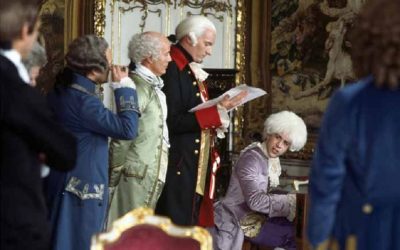In the 1950s I enjoyed listening to a popular radio program called “The Shadow.” The hero was Lamont Cranston who had learned the art of becoming invisible from some oriental guru. This allowed him to spy on would-be criminals without being detected. “What evil lurks in the hearts of men? The Shadow knows.” The most memorable episode for me involved catching a nihilist who took pleasure in breaking into museums and destroying valuable artworks.
This episode was brought to mind by the recent museum attacks in Europe. Gangs of radical environmentalists threw food and liquids at various famous paintings as a protest against pollution. Though the paintings were protected by plastic shields, the actions got support from many (though not all) citizens including the media. The perpetrators and some commentators saw it as a clever tactic.
But what was the real meaning of these actions? Why attack famous artworks rather than, say, billboards? Because they are important values, painted with infinite care and skill, worth many millions of dollars, displayed in special buildings and galleries, selected over millions of possible alternatives, enjoyed by millions across in some cases hundreds of years, and protected by expensive security measures. The meaning was an attack on values as such. As Ayn Rand says in the Romantic Manifesto, art connects to one’s deepest, metaphysical values.
What does it mean to attack values as such? The deepest motive is nihilism, destruction for the sake of destruction. This was the evil motive identified in the Shadow episode noted above. To hate values means to hate life which means to hate existence (see Atlas Shrugged). Nihilists do not want to fix things; they want to destroy them.
One might ask why the attacks did not go farther. Why were cutting tools not smuggled in in order to destroy the paintings? ( I believe in one case a student had a grenade in her backpack but did not try to use it). My hypothesis is that the attackers wanted to see what they could get away with—as a prelude to further, more violent, terrorist attacks which would not be confined to museums or even to ecology issues. Let’s hope many people stand up to them.
Here is an integrity test for environmentalists. Let’s say they really believe that the earth is getting too hot and we must find a practical alternative to oil. But if so, why the push for the three losers: windmills do not work without wind, solar does not work without sun, and large batteries only last a few hours. Further, these need subsidies (paid for with tax money), are not reliable, increase costs, may be very noisy, take up lots of space, harm birds and animals, and requires the use of minerals the supply of which is dominated by dictatorships. In contrast, nuclear should not require subsidies, is safe, takes up little space, is quiet, does not pollute, and works 24/7. So why don’t they demand this? Perhaps they are more interested in destroying the capitalistic oil industry than in solving the supposed problem in the most efficient way.




